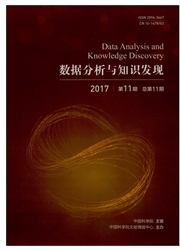

 中文摘要:
中文摘要:
为探查社会化标注系统中用户标注动机的个体差异性,本文从用户的活跃度出发,利用信息熵理论研究用户活跃度与标注动机之间的关系。在区分社会化标注系统中“利己”和“利他”两种基本动机基础上,将社会化标注系统类比为数字通信系统,基于信息熵理论定义了编码熵、解码熵和私有效用度等刻画用户标注动机的量化指标,并结合来自Last.fm和Delicious的数据对用户活跃度与标注动机之间的关系展开实证分析。实证结果表明,社会化标注系统中用户的标注行为既服务于分享交流资源的“利他”目的,也服务于自身资源发现获取的“利己”目的,但是随着用户活跃度的提升其“利己”效用得到不断增强,并逐步稳定在系统总体的“利己”效用水平附近。进而从标签的功能和大众化程度对标注动机差异化的实证结果作出了解释并提出了对社会化标注系统用户和服务商的启示建议。
 英文摘要:
英文摘要:
To explore individual differentiation of users' tagging motivation in social tagging systems, viewing from the perspective of users' activity, the relationships between users' activity and their tagging motivation are studied based on theories of information entropy. After two types of basic tagging motivations of "selfish" and "altruistic" in social tagging systems are distinguished, the measures used to describe users' tagging motivation, such as the encoding entropy, the decoding entropy and the degree of self-utility, are defined by regarding the social tagging system as a digital communication system. An empirical study is carried out with the data from Last. fm and Delicious. The empirical results show that users' tagging behavior not only serves to share resources which is "altruistic" also serves to discover and retrieve resources for themselves which is the "selfish", and the "self- utility" is enhanced and is gradually stabilized in the "self-utility" level of the system with the increasing of users' activity. The empirical results are further explained from the functions and popularization of tags, and some suggestions for both tagging users and service providers of social tagging system are given.
 同期刊论文项目
同期刊论文项目
 同项目期刊论文
同项目期刊论文
 期刊信息
期刊信息
